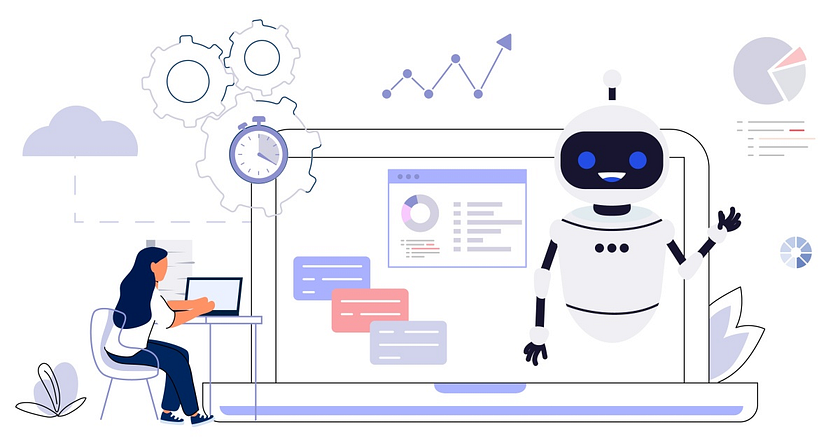Enhancing Customer Experience Through AI: The Future is Now

In today’s fast-paced digital world, customer experience (CX) has become a crucial factor in the success of any business. Consumers are no longer just buying products — they are investing in experiences. To meet these ever-evolving expectations, businesses are turning to Artificial Intelligence (AI) to transform the way they interact with customers. From predictive analytics to real-time chatbots, AI is redefining customer journeys and enabling brands to offer more personalized, efficient, and proactive service than ever before.
What is AI in Customer Experience?
AI in customer experience refers to the use of intelligent algorithms, machine learning, and natural language processing (NLP) to understand, predict, and respond to customer needs. AI-driven systems can analyze massive amounts of customer data to offer real-time support, automate routine queries, and provide insights that help businesses optimize their customer strategies.
By integrating AI into customer service operations, businesses can move from reactive service models to proactive and even predictive ones — delivering help before a customer even realizes they need it.
Key Applications of AI in Customer Experience
1. Chatbots and Virtual Assistants
One of the most common AI applications in CX is the chatbot. AI-powered bots can handle thousands of customer queries simultaneously, 24/7, without the need for human intervention. These virtual assistants are designed to simulate human conversation and resolve basic customer inquiries like order tracking, account details, or FAQs.
Advanced chatbots powered by NLP can also understand context, tone, and sentiment, allowing them to provide more human-like and empathetic interactions.
2. Personalization at Scale
AI can analyze customer data — such as browsing history, purchase behavior, and feedback — to deliver highly personalized experiences. For example, e-commerce platforms use AI to recommend products based on a user’s preferences, while streaming services suggest content tailored to individual tastes.
This kind of personalization not only improves customer satisfaction but also drives customer loyalty and increases conversion rates.
3. Predictive Customer Insights
With predictive analytics, AI can forecast future customer behavior based on past interactions. For instance, AI can identify when a customer is likely to churn and alert customer service teams to take preventive actions, such as sending a personalized offer or reaching out with a proactive call.
Predictive insights help businesses to stay one step ahead, offering solutions before problems arise and making the customer journey smoother and more satisfying.
4. Automated Customer Feedback Analysis
AI tools can scan through large volumes of customer feedback from surveys, social media, and reviews to extract valuable insights. Sentiment analysis helps brands understand how customers feel about their services, allowing them to make data-driven decisions to improve customer satisfaction.
This automated process saves time and ensures that no feedback goes unnoticed, giving businesses a clear picture of customer sentiment in real time.
5. Voice Assistants and Speech Recognition
AI-powered voice assistants like Siri, Alexa, and Google Assistant are becoming increasingly popular. Businesses are now integrating similar technology into their customer service systems, allowing users to interact using voice commands.
This is particularly helpful for on-the-go users or individuals with disabilities, creating a more accessible and user-friendly customer experience.
Benefits of AI in Customer Experience
✔️ Speed and Efficiency
AI reduces wait times and resolves queries faster than human agents, leading to quicker solutions and higher customer satisfaction.
✔️ 24/7 Availability
Unlike human support teams, AI tools operate round the clock, ensuring that customers get help whenever they need it — day or night.
✔️ Cost Savings
By automating routine tasks, companies can reduce their reliance on large customer support teams, cutting down operational costs while maintaining service quality.
✔️ Data-Driven Decisions
AI provides valuable customer insights that help businesses make smarter, more strategic decisions regarding product development, marketing, and service improvements.
✔️ Consistent Service
AI delivers consistent answers and experiences across all channels, eliminating human errors and ensuring uniformity in communication.
Challenges of Using AI in Customer Experience
While AI offers numerous advantages, it is not without challenges:
- Lack of Human Touch: AI cannot fully replace human empathy in complex or emotionally sensitive situations.
- Privacy Concerns: The use of personal data by AI raises concerns about data security and privacy.
- Implementation Complexity: Integrating AI into existing systems can be technically challenging and requires significant investment.
To overcome these hurdles, businesses should aim for a balanced approach — using AI to augment, not replace, human interactions. The goal should be to let AI handle repetitive, data-heavy tasks while human agents focus on more complex and emotional customer needs.
The Future of AI in CX
As AI technologies continue to evolve, their role in shaping customer experience will only grow. Future advancements could include more emotionally intelligent AI, improved voice recognition, and even hyper-personalized virtual shopping assistants.
Moreover, with the rise of the metaverse and immersive technologies, AI will play a crucial role in creating engaging and interactive customer experiences across new digital environments.
Final Thoughts
AI is no longer just a buzzword — it’s a powerful tool that is changing the face of customer experience. Businesses that leverage AI thoughtfully and ethically can unlock tremendous value, not just in terms of efficiency and cost savings, but in delivering the kind of experiences that today’s customers crave: fast, personalized, and seamless.
The key lies in finding the right balance between human intuition and machine intelligence. Together, they can create an unbeatable customer experience that fosters trust, loyalty, and long-term success.


Comments
Post a Comment